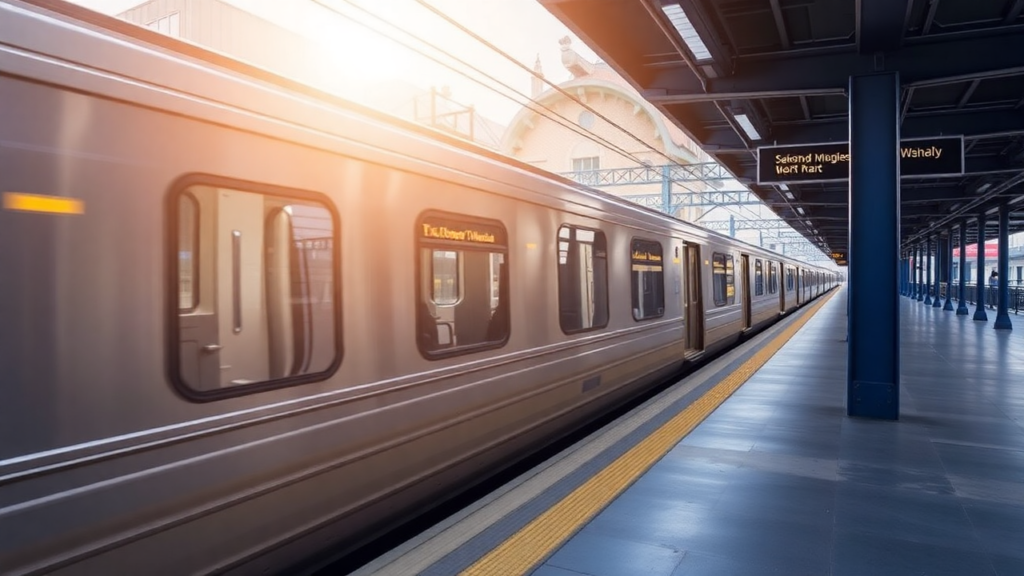The North Berkeley BART station resumed normal operations Monday afternoon, June 9th, following a serious incident that hospitalized one person after a collision on the tracks. The station was temporarily closed for approximately one hour while emergency responders attended to the injured individual.

Incident Details and Timeline
BART officials confirmed that emergency services responded to the North Berkeley station shortly after 10 a.m. on Monday. The collision involved what appears to be a pedestrian and a BART train, though official details regarding the circumstances remain under investigation.
A BART spokesperson states, “A person has been removed from the trackway and is being transported to a hospital.” The individual’s current condition has not been disclosed, and authorities have not released information about the severity of injuries sustained.
The station reopened around 11 a.m., allowing regular train service to resume with minimal ongoing disruption to commuters. During emergencies like Monday’s incident, BART also implements passenger communication protocols to inform riders about service disruptions and alternative transportation options.
The transit system coordinates with AC Transit and other local transportation providers to minimize inconvenience for affected commuters. In contrast, station agents and transit police work to manage crowd control and ensure passenger safety during the emergency response period.
BART Safety Protocols During Emergencies
When incidents occur on BART property, the transit system follows established emergency protocols to prioritize passenger and public safety. These procedures typically include:
- Immediate suspension of train service in the affected area
- Coordination with local emergency services
- Safe removal of any individuals from the track areas
- Thorough inspection of tracks and equipment before resuming service
- Investigation into the circumstances surrounding the incident
Additionally, BART’s emergency response team immediately assesses all equipment and infrastructure following any track-related incident. This includes detailed inspections of train cars, track integrity, and electrical systems to ensure no damage occurred that could compromise future operations.
BART authorizes the resumption of regular service only after these comprehensive safety checks are completed and all emergency personnel have cleared the scene.
Understanding BART Track Safety
BART tracks present significant safety hazards to unauthorized individuals. The system operates high-voltage third rails that power trains, creating additional dangers beyond moving trains. Tracks are designed exclusively for train traffic, making unauthorized access illegal and extremely dangerous.
Beyond the immediate physical dangers, BART tracks are located in areas with limited escape routes and poor visibility for pedestrians and train operators.
Trains can approach at speeds up to 80 mph and require significant distances to come to a complete stop, making it nearly impossible for operators to avoid collisions once an unauthorized person is spotted on the tracks. The system’s automated safety features are designed for predictable train movements, not for responding to unexpected obstacles or individuals in the trackway.
Legal Considerations for BART Accidents
When accidents occur on public transit property, several legal factors may come into play depending on the circumstances. Potential considerations include:
Liability Assessment: A thorough investigation is required to determine whether the transit agency, the injured party, or other factors contributed to the incident.
Premises Liability: Public transit agencies have certain obligations to maintain reasonably safe conditions on their property.
Comparative Negligence: California law considers the degree of fault assigned to different parties when determining legal outcomes.
Documentation Importance: Preserving evidence from the scene, including surveillance footage and witness accounts, becomes crucial for any potential legal proceedings.
Government Claims Requirements: Since BART is a public transit agency, specific procedural requirements and shortened time limits may apply when filing claims against the agency. California’s Government Claims Act requires potential claimants to file administrative claims within six months of an incident, making prompt legal action essential for preserving rights and ensuring compliance with statutory deadlines.
Seeking Legal Guidance After Transit Accidents
Individuals involved in accidents on public transportation systems face unique legal challenges. These cases often involve complex questions about government liability, insurance coverage, and regulatory compliance.
Consulting with experienced personal injury attorneys familiar with transit accident cases can help protect legal rights and ensure proper investigation of all circumstances.
Transit accident cases require immediate attention to preserve evidence and meet specific procedural requirements that may differ from standard personal injury claims.
BART’s Ongoing Safety Initiatives
The Bay Area Rapid Transit system continues implementing various safety measures to prevent unauthorized track access and reduce accident risks. These efforts include enhanced fencing, improved lighting, and public awareness campaigns about the dangers of entering restricted areas.
Regular safety inspections and equipment maintenance also play crucial roles in preventing accidents and ensuring system reliability for the millions of passengers who depend on BART services throughout the Bay Area.
BART has also invested in advanced surveillance technology and emergency communication systems to improve incident response times. These systems include strategically placed cameras throughout stations and trackways, emergency call boxes, and direct communication lines to BART police.
The agency regularly conducts safety training exercises with local emergency responders to ensure coordinated and efficient responses to accidents, helping minimize response times and potential complications during critical situations.
Understanding Train Accident Settlement Values
Train accident settlement calculators can provide initial estimates for potential compensation by considering factors unique to transit incidents. These tools evaluate medical expenses, lost wages, pain and suffering, and long-term disability costs associated with train-related injuries.
However, it’s essential to understand that settlement calculators offer only preliminary assessments and cannot account for the complex variables that affect BART accident cases, such as government liability limitations, comparative fault determinations, and the specific circumstances surrounding track access incidents.
While these calculators can help victims understand potential compensation ranges, the unique legal and technical aspects of transit accidents require professional evaluation to assess case value and develop effective legal strategies accurately. Call us now at +1 415-986-4777 to talk to the experts.
Community Impact and Recovery
Incidents at major transit hubs like North Berkeley BART can affect entire communities beyond commuters. Local businesses, residents, and connecting transportation services may experience temporary disruptions during emergency responses.
The relatively quick resolution of Monday’s incident, with service resuming within an hour, demonstrates the coordination between BART officials and emergency responders in managing such situations while prioritizing public safety.
As investigations continue into the circumstances surrounding this collision, the focus remains on the injured individual’s recovery and preventing similar incidents in the future. Anyone with information about the incident is encouraged to contact BART police or local authorities.
Moving Forward
“When someone is injured in a BART accident, families are often overwhelmed by medical bills, uncertainty about recovery, and questions about what happened. These incidents can instantly change lives, and victims deserve answers and support during this difficult time. Transit accident cases involve complex legal and technical issues that require immediate investigation to preserve crucial evidence like surveillance footage and maintenance records. If you or someone you love has been hurt in a BART accident, don’t wait to seek legal guidance. The sooner we can begin investigating your case, the better we can protect your rights and help secure the compensation you need to focus on healing.”– Andy Gillin, GJEL Accident Attorneys
If you or a loved one were injured in the Berkeley train accident, don’t face the aftermath alone. Our experienced team at GJEL Accident Attorneys understands the physical, emotional, and financial challenges you’re experiencing. We’re ready to evaluate your case, explain your rights, and fight for the compensation you deserve—all while you focus on recovery.
Contact us today for a free, no-obligation consultation. Remember, we only get paid when you do. GJEL offers free consultations and charges no fees unless we win your case. Call us at +1 415-986-4777 or visit our San Francisco office to protect your future.
Resources and Contact Information
If you witnessed the incident or have information that could assist in the investigation, the following agencies are coordinating the response:
BART Police Department
- Emergency: 911
- Non-Emergency: (510) 464-7000
- Text Tips: Text “BARTPD” + your tip to 510464
- Online Reporting: Available through BART’s official website
Berkeley Police Department
- Emergency: 911
- Non-Emergency: (510) 981-5900
- Address: 2100 Martin Luther King Jr Way, Berkeley, CA 94704
- Online Services: The City of Berkeley Police Department website offers incident reporting and community resources
California Public Utilities Commission (CPUC)
- Rail Safety Branch: (415) 703-2782
- Address: 505 Van Ness Ave, San Francisco, CA 94102
- Online: CPUC.ca.gov – Provides oversight of rail safety and incident reporting for California transit systems
AC Transit (Alternative Transportation)
- Customer Service: (510) 891-4777
- Trip Planning: 511.org
- Real-time Information: AC Transit mobile app
These agencies work together to investigate transit incidents, ensure public safety, and provide support services for affected community members. The Berkeley Police Department collaborates with BART police on incidents occurring within city limits, while the CPUC provides regulatory oversight for rail safety matters throughout California.



 AI-search
AI-search  Email
Email